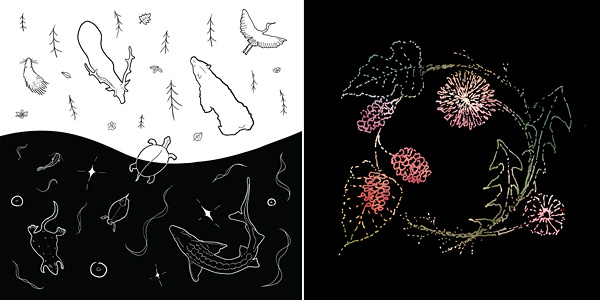
Welcoming proposals for original artwork to be presented as part of the exhibition: Journey With Our Kin at Cambridge Art Galleries, Queen’s Square from October 24, 2022 – January 22, 2023.
Submission Deadline: Monday, June 13, 2022
Submit your proposal online.
Guided by Cambridge Art Galleries | Idea Exchange and artist-curators Amina Lalor and Dani Kastelein-Longlade, Journey With Our Kin is an exhibition that will showcase artwork that explores relationships to land in Cambridge, Kitchener-Waterloo, Guelph, and the surrounding regions. We use the term “land” to mean the interconnected network of creation that includes the earth, air, water, sun, moon, plants, fungi, and animals. We are seeking artworks that respond to one or more of the following lines of inquiry:
- What does it mean to care for the land that cares for us? How do we foster kinship among all our relations?
- How do we reconcile and bring together multiple perspectives in order to build community in connection with the land?
- How do we build on our capacity to care for the land? What skills do we need to do so?
- How do we creatively express our journeys of (re)connection with our other-than-human kin?
Dani Kastelein-Longlade and Amina Lalor will work together with three (3) successful applicants to plan community events (workshops, lectures, etc.) which will enable the public to learn more about each artist’s work and provide the opportunity to share perspectives, stories, and knowledge on how to form deeper land-based connections. The goal of this exhibition is to create a space that builds on the community’s collective knowledge on how to reconnect and better honour our relationships to land.
Submission Guidelines:
Please submit your proposal online, including:
- Project title and description (100-200 words)
- Biography and/or CV
- Support Material: 5 to 10 relevant images/media files/links representing proposed or previous work
- Image list
Cambridge Art Galleries welcomes submissions from members of equity-deserving communities including women, Indigenous and racialized persons, persons with disabilities, and persons of all sexual orientations and gender identities.
Image credits:
Left: Dani Kastelein-Longlade, Relations, 2022, digital illustration. Courtesy of artists.
Right: Amina Lalor, mulberries & dandelions, 2020, mixed media illustration. Courtesy of artist.
Artist-Curator Bios:
Amina Lalor (she/her) is a mixed Vietnamese-Irish-Métis designer and researcher based in Tkaronto on Treaty 13 within the Dish With One Spoon territory. Amina carries the role of Research Project Manager for “Nokom’s House,” a proposed Indigenous land-based research lab at the University of Guelph led by Indigenous scholars Dr. Kim Anderson, Dr. Sheri Longboat, and Dr. Brittany Luby. Amina is also an adjunct instructor at the University of Waterloo School of Architecture, where prior she earned a Bachelor of Architectural Studies and a Master of Architecture. She is currently teaching a second-year elective course titled “Building Kinship: Land-Based Community Engagement in Design.” Amina’s continued research explores the meaning of practicing architecture and design “in a good way” on Indigenous lands within a violently imposed settler-colonial context.
Dani Kastelein-Longlade (they/them) is an architectural designer within the Indigenous Design Studio at Brook McIlroy, an architecture, urban design, landscape architecture, and planning firm with offices in Toronto, Thunder Bay, and Winnipeg. Dani is also an artist and illustrator who is active in the academic community as a published researcher and lecturer. A registered citizen with the Métis Nation of Ontario, they hold kinship ties that extend from the Red River to the surrounding regions of Georgian Bay as a Drummond Island descendent (Aabitaawizininiwag). Dani earned their Master of Architecture degree in the Collaborative Water Program at the University of Waterloo and is currently residing in Block 2 of the Haldimand Tract, land that was promised to the Haudenosaunee, also known as the Six Nations of the Grand River.
This exhibition is presented in collaboration between Cambridge Art Galleries | Idea Exchange and The University of Waterloo School of Architecture.
For more information about Cambridge Art Galleries, visit ideaexchange.org/art, call 519.621.0460, or follow us on Twitter or Facebook, or Instagram, or YouTube
Media Contact:
Karly Boileau, Assistant Curator, Cambridge Art Galleries
519.621.0460 x160
kboileau@ideaexchange.org

Cambridge Art Galleries | Idea Exchange presents contemporary art from two galleries in the City of Cambridge: Preston and Queen’s Square. We serve our regional and broader communities through the delivery of contemporary art programs that foster critical cultural dialogue. Our artistic activities engage, embrace, and empower people of all ages and abilities from diverse backgrounds.
Cambridge Art Galleries is situated on the traditional land of Indigenous peoples dating back countless generations. We recognize that it is part of the Haldimand Tract, the traditional land of the Six Nations of the Grand River and Mississaugas of the Credit First Nation.
The University of Waterloo School of Architecture is a leader in design education and research. It offers a fully cooperative professional program and has been rated the greenest architecture curriculum in Canada. It is also the only Canadian school of architecture to have a permanent international facility, which has operated since 1979 in Rome, Italy. The school attracts top students from across Canada and around the world.
The University of Waterloo acknowledges that much of our work takes place on the traditional territory of the Neutral, Anishinaabeg and Haudenosaunee peoples. Our main campus is situated on the Haldimand Tract, the land granted to the Six Nations that includes six miles on each side of the Grand River. Our active work toward reconciliation takes place across our campuses through research, learning, teaching, and community building, and is centralized within our Office of Indigenous Relations.

